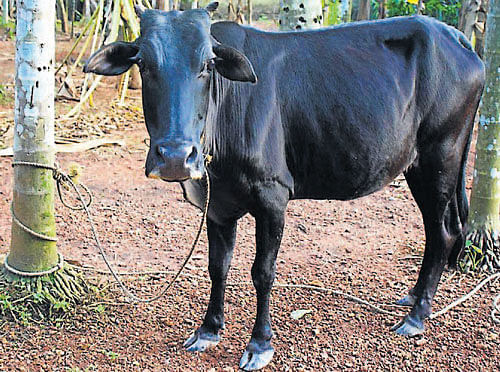
Overwhelmed by the salient features of the world’s smallest and second smallest cattle— Vechur cow and Kasargod dwarf, Punjab Chief Minister Parkash Singh Badal has asked to send three each of the native breeds to his farm in Chandigarh, in exchange for high milk yielding cattle from his farm.
Six cattle from Nagacheri farm at Neeleshwaram here will traverse to Punjab CM’s bungalow next month, said P K Lal, Director of Kasargod Dwarf Conservation Society, which runs the Nagacheri farm meant exclusively for protecting indigenous breeds of cattle.
Lal had participated in a national workshop on Livestock Keeper’s Right held at National Bureau for Animal Genetic Resources (NBAGR), Karnal in Haryana in July and had a presentation on Kasargod breed of cow. Impressed by the salient features of the breed, Lal was invited to Badal’s farm and subsequently, the CM requested a pair of breeds.
In return, six high milk yielding Sahiwal breed from Punjab will reach Nagacheri farm, which currently boasts of 40 native breeds including Vechur, Kasargod dwarf, Kapila, Malnad gidda and Gir. “The Punjab government will send a specially designed vehicle to transport six cattle to Chandigarh,” Lal told Deccan Herald.
Kasargod dwarf
The indigenous Kasargod dwarf cow has been considered as the world’s smallest cattle after Vechur breed, another genre of cattle from Kerala itself.
According to Vechur Conservation Trust, a forum dedicated to conserve the domestic animal diversity of Kerala, the Kasargod dwarf bull are on an average 107.3 cm tall while the cows have a height of 95.83 cms. Kasargod male calves gain about 7.8 times the birth weight at one year of age and this kind of growth rate is observed to be the highest ever reported for any Indian cattle at this stage.
Small cows are excellent milkers because their feed to milk ratio is high as compared to any hybrid cows. Kasargod dwarf will give 2.5 to 3 litres of milk per day and it can well survive on kitchen waste and jungle feeds.
Dr Sosamma Ipe of Vechur Conservation Trust said that the milk of Kasargod dwarf is nutritious and rich in alpha-2 casein proteins, which was recommended for diabetic and hypertension patients. Also, face mask, bath oil, foot balm etc were being made out of its milk, manure and urine products apart from using as medicinal herbs.
Not in the NBAGR list
The breed which has been found mainly in the hilly areas of Kasargod taluk is well adapted to the hot and humid climate of the region with having high heat tolerance and disease resistance. But due to the extensive cross-breeding and mass slaughtering for food, the number has dwindled to less than 2,000 now, said Lal.
As a result, it could not find a place in the 37 native cattle breeds of India, documented by the NBAGR.
Of late, following an outcry from various quarters, Kerala government has announced a high-tech cattle farm at Bela in Badiyadka gram panchayat to develop it as a centre to study, research and popularise Kasargod dwarf breed, under the Central Veterinary University.
The Amrutha Dhara goshala, near Perla is also taking care of the rare variety with having more than 200 collections.